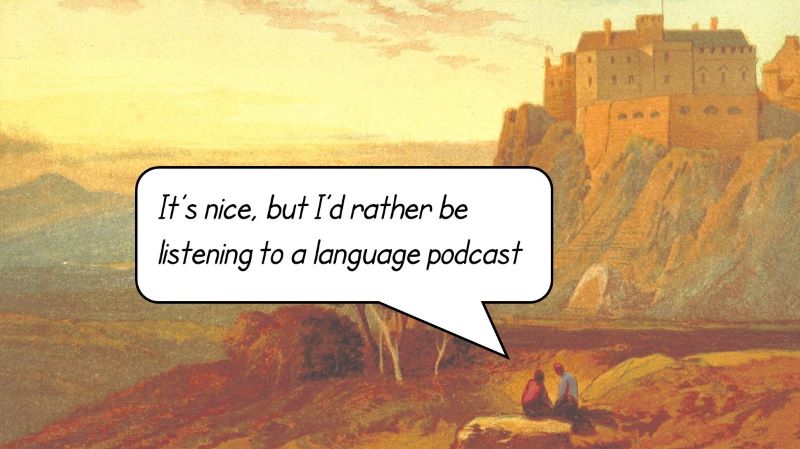If you have been googling around, looking for a good list of podcasts on the English language, then you have come to the right place. This list is the best list, and I can confidently say that, because this list includes ALL the podcasts I have been able to find. Every single one of them.
I love the English language so much that I write two newsletters about it, and when I’m not writing or reading, I’m listening!
Here are 55 podcasts specifically about English, but also about linguistics in general. I’ve got them all in my podcast feed and have attempted to give each and every one a listen and a little review.
Contents
Here is a handy list of all the podcasts I’m going to be discussing.
- All-round English podcasts
- Podcasts about the history and development of English
- Podcasts about lexicography (dictionary writing) & lexicology (words)
- Etymology podcasts
- Podcasts about linguistic discrimination
- General linguistics podcasts
- Discourse analysis
- Other
- Podcasts that didn’t make it onto the list
- Did I forget a podcast, or get something wrong?
All-round English podcasts
These podcasts are about all the facets of English: about words, where they come from and how we use them, about accents, about grammar, about the study of linguistics, about written English, spoken English, and everything else you can think of.
Basically, these podcasts didn’t fit into one of the narrower categories below, so they have been lumped in up here 🙂
My personal favourite for this category is Fry’s English Delight, which is as delightful as its name suggests. (Though it may be a bit too British for Americans, but there’s plenty more for them to choose from.)
A Way with Words
Length: 50 minutes
Network: NPR
Frequency: once a week
Years: 1998 – present
Subject: Lexicology, etymology, familects, some phonology
Format: call-in radio show, two hosts chatting
Type of English: American
Linguists Martha Barnette and Grant Barrett answer questions like “I learned this phrase from my parents but nobody else seems to know it, am I crazy?” and “Where does this word come from?” They are thoroughly charming and, importantly, always positive. They never tell listeners that they are using English in the wrong way because (newsflash) they aren’t. Mostly covers American and Canadian English, though they now have lots of podcast listeners from all over and are becoming more international because of that.
For me, the phone-in-radio format took a little getting used to, but I have grown to love it. (Dec 2022)
Fry’s English delight
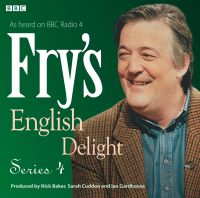
Length: 27 minutes
Network: BBC
Frequency: four episodes a year, no new episodes
Years: 2008-2019
Subject: Lexicology, etymology, sociolinguistics, literature, society
Format: radio documentary
Type of English: British English
This is actually not a podcast, but a BBC radio 4 programme which was broadcast in 4 episodes a year from 2008 to 2019. In my podcast app it is dubiously called Frys English Delight with a missing apostrophe, and it doesn’t look like it was published by the BBC. Ah well, c’est la vie. Beggars can’t be choosers.
The Fry in question is Stephen Fry, of course, who has a voice to die for and little jokes that will keep you uplifted as you clean the house or drive home from work. The episodes have something interesting for everyone, no matter how much you know or don’t know about the English language. (Dec 2022)
Grammar Girl
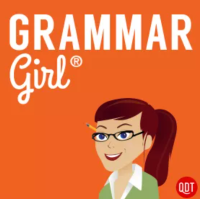
Length: 15 minutes (interviews about 30 minutes)
Network: Independent
Frequency: once a week
Years: 2006 – present
Subject: etymology, English grammar, new English, familects, lots more
Format: usually one host talking, some callers, interview episodes every few weeks
Type of English: American
In my podcast app, the full title of the podcast reads “Grammar Girl Quick and Dirty Tips for Better Writing”. Don’t let that title fool you. This podcast is not only about grammar tips (though I think it used to be). Instead, host Mignon Fogarty talks you through interesting facts and news about the English language. (Dec 2022)
Lexicon Valley

Length: about 30 minutes, sometimes longer
Network: Booksmart Studios (used to be Slate)
Frequency: once a week
Years: 2016 – present
Subject: Linguistics, etymology, grammar, sociolinguistics, literature
Format: one host talking, some music
Type of English: American
Listening to John McWhorter’s podcast is like visiting your kindly old English professor’s office and having him give you an impromptu lecture on whatever it was that piqued his interest just moments before. He also plays music!
It’s a treat. McWhorter has a voice like satin, and great musical taste.
Note: when I first searched for Lexicon Valley, my podcast app gave me Spectacular Vernacular. This is because John McWhorter moved from Slate to Booksmart Studios, and Slate chose to archive the show under the banner of its successor. (Dec 2022)
Lexis

Length: varies between 35 minutes and an hour
Network: Independent
Frequency: irregular, on average about twice a month
Subject: Linguistics, academia, English as a school subject, English in the news
Format: one interview, then four hosts chatting
Type of English: British
A podcast about language and linguistics for British students in the last years of secondary school, teachers, and anyone else who’s interested in language. Linguist tweeters/bloggers Matthew Butler, Lisa Casey, Dan Clayton and Jacky Glancey interview a researcher or other English-language professional, and also discuss English in the news.
A work of love rather than a swanky professional podcast. Four presenters sounds like a lot, but it works well. It’s the kind of podcast that always teaches me something new. (Dec 2022)
Spectacular Vernacular
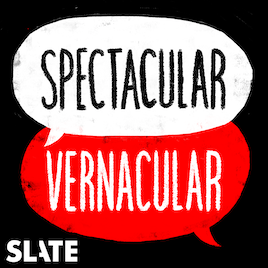
Length: about 35 minutes
Network: Slate
Frequency: n/a
Years: 2021 – 2022 (archive goes back to 2012, see below)
Subject: English but also general linguistics and social justice linguistics
Format: two hosts talking, then conducting a short interview and then a puzzle
Type of English: American
Most Spectacular Vernacular podcast episodes break down into three parts: first hosts Linguist Nicole Holliday and Wall Street Journal language columnist Ben Zimmer discuss some linguistic point, then they interview a scholar or a writer, and in the last bit they do a word puzzle with a regular-person guest.
Nicely edited (I loved the episode where they discuss Anthony Fauci’s New York accent and rather than just talking about it like many chatty podcasts they actually play clips so you can hear it for yourself). Holliday and Zimmer have a good knack for being entertaining and informative at the same time.
The word-puzzle bit is not my cup of tea, so for me it’s good that it is at the end. I just switch off at that point. However, I can also totally see how the word puzzle would be an added bonus for lots of language lovers. (Jan 2023)
About the archive:
Spectacular Vernacular only ran for a year, but its archive goes back to 2012 because Slate put all the old Lexicon Valley episodes in there. It is very confusing. With a quick scroll and a few strategic listens, this is what I have worked out:
Episodes dating from 2012 to 2016 were Lexicon Valley with Bob Garfield and Mike Vuolo
Episodes dating from 2016 to 2021 were Lexicon Valley with John McWhorter
In 2021 Lexicon Valley with John McWhorter moved to a new feed, and Slate changed the old feed into Spectacular Vernacular. All the old Lexicon Valley episodes also got marked as Spectacular Vernacular, which is what makes the archive (to me) so confusing.
That’s what they say
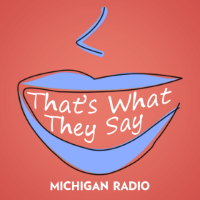
Length: 5 minutes
Network: Michigan radio/ NPR
Frequency: once a week
Years: 2012 – present
Subject: Lexicology, some phonology, etymology and world Englishes
Format: one specialist talking to a non-specialist
Type of English: American English
If you are looking for a bitesize language podcast, then this is the one for you. In just five minutes University of Michigan English Professor Anne Curzan discusses an interesting term or answers to audience questions with radio host Rebecca Kruth. Short, charming, to-the-point. I usually wait until I have five episodes or so in my feed and then queue them up and listen to the lot.
The Allusionist
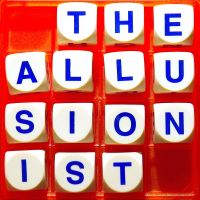
Length: about 40 minutes
Network: Independent (used to be Radiotopia)
Frequency: twice a month
Years: 2015 – present
Subject: Linguistics, sociolinguistics, lexicography, etymology, social justice linguistics
Format: edited interviews, sometimes documentary
Type of English: host is British, focus is international
A podcast about language by Helen Zaltzman, who has such a gorgeously calming voice that during stressful pandemic times she rebranded into the Tranquillusionists and just said nice and soothing things for 20 minutes.
I adored the Allusionist when I first discovered it and listened to all the episodes I had missed back to back. Fascinating etymology, great interviews, well-edited and with a good dose of Zaltzman’s excellent sense of humour. Some recent episodes are a bit political; if that’s not your cup of tea you should listen to the old ones first, or check the episode descriptions before you press play (Jan 2023).
Word of Mouth
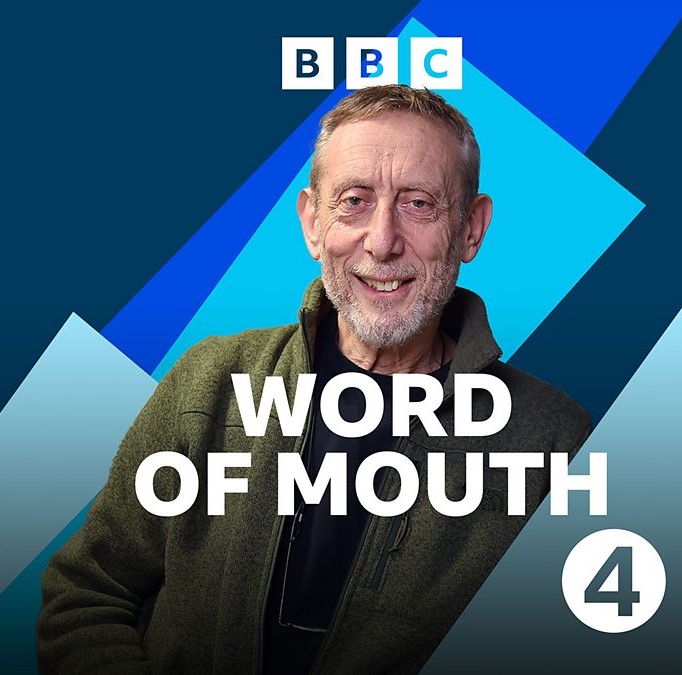
Length: 28 minutes
Network: BBC
Frequency: once a week
Years: 1992 – present
Subject: Lexicology, sociolinguistics
Format: host interviews a different specialist each week
Type of English: British
This venerable BBC programme, hosted by author Michael Rosen, looks at all aspects of the spoken word from slang, acronyms, strange vocabulary, jargon and poetry; along with etymology, and at language changes through time and society.
I have as yet only listened to the episode “Ghosting, caking and Breadcrumbing” where cyber-psychologist Dr Nicola Fox Hamilton discusses words and expressions from the world of online dating. The way Rosen (76) is nonplussed by all of this, but still remains respectful and interested, is quite delightful. (Jan 2023)
Podcasts about the history and development of English
🔥History of English Podcast
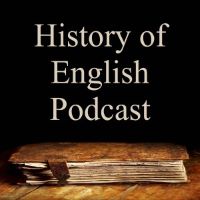
Length: usually between 50 and 70 minutes
Network: Independent
Frequency: once a month
Years: 2012 – present
Subject: History and etymology
Format: one host talking
Type of English: host is American, focus is international
I’m interested in etymology, and I’m interested in history, and this brilliant English language podcast combines the two. Kevin Stroud takes meticulous care in his episodes to make sure we don’t miss a single aspect of the history of English. This means the episodes are long, and there are a lot of them. It’s just Stroud speaking, which took me a bit of getting used to, but I’m glad I stuck with it.
Stroud works in chronological order and is now up to the second half of the Elisabethan period. Every episode covers the history of the time period, adds relevant etymology, but also often dives in to the history of linguistics itself and other cool meta-knowledge. I have learned more history of English from this podcast than in my English university degree, and have done so while doing the washing up and cleaning the floor. (Dec 2022)
Why is English?
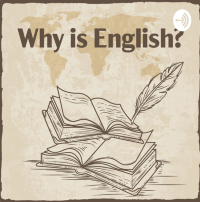
Length: between 20 and 40 minutes
Network: independent
Frequency: n/a
Years: 2020-2021
Subject: history of English
Format: one host talking
Type of English: American
This unassuming little podcast is an absolute treat. Host Laura Brandt is eloquent and funny, and her podcast is full of little linguistic facts that I keep wanting to jot down so I can be more interesting at parties.
A love-letter to descriptivism, this podcast is aimed at non-linguists, but as a linguist I still enjoyed listening to it. (Jan 2023)
Podcasts about lexicography (dictionary writing) & lexicology (words)
My favourite in this category is Fiat Lex, which talks about how dictionaries are made. It’s informative, the hosts are funny, and it is well-produced.
🔥Fiat Lex
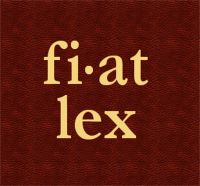
Length: about 25 minutes
Network: Podbean
Frequency: n/a
Years: 2018
Subject: writing dictionaries
Format: two hosts talking
Type of English: American
Kory Stamper and Steve Kleinedler are funny, articulate and insightful. I’m really interested in dictionaries and am thoroughly miffed that this podcast stopped after just one season. (Jan 2023)
Having Words with Susie Dent
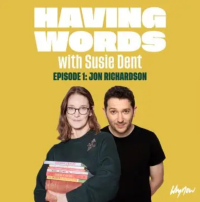
Length: about 35 minutes
Network: WhyNow
Frequency: once a month
Years: 2022 – present
Subject: lexicology, lexicography, society
Type of English: British
I love Susie Dent, who is easily the UK’s most famous lexicographer. In this show she interviews famous Brits, mostly comedians, about how they use words and language.
My biggest problem with this language podcast is that I cannot find it in my podcast player, so I have only listened to the one episode. Susie! Send me the RSS feed url, so I can find your podcast and listen to it! (May 2023)
Pants in the boot

Length: usually between 10 and 20 minutes
Network: The incomparable
Frequency: irregular
Years: 2019 – present
Subject: lexicology, world Englishes compared
Format: one host and a rowdy panel
Type of English: mixed
Host Glenn Fleishman invites a panel of 5 or so people from the UK, America and other English speaking countries to discuss the meaning of words like “biscuit”, “pants”, “boot”, “lemonade” etc.
The differences between the English variants spoken in the world is something that interests me immensely, so I was very excited to learn about this podcast. But I soon learned this is a podcast for fun more than for serious lexicological data gathering. This is because it is difficult to know who’s talking and where they come from. Still, a lot of fun and I’ll be listening to all the episodes. (Jan 2023)
The Millennial Dictionary
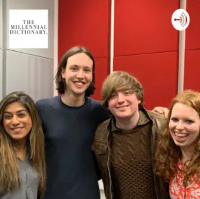
Length: about 30 minutes
Network: independent
Frequency: n/a
Years: 2019
Subject: millennial slang
Format: panel discussion
Type of English: British
This podcast only ran for three episodes, which is a shame as I felt they were just starting to find their feet by the third one.
Slang and neologisms are some of my favourite subjects to talk about, and I listened to all three episodes. The format needed work; the panellists play a game, with one of them knowing the definition of the word and the others guessing. This gets old quickly. But the hosts are genuinely funny, and the group has great rapport and banter. It could have been great, what a shame that it stopped so soon. (Dec 2022)
Word for Word
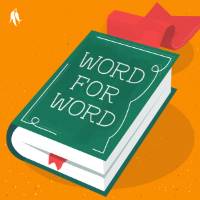
Length: varies, often about 25 minutes
Network: Macquarie Dictionary
Frequency: n/a
Years: 2016 – 2021
Subject: lexicography, lexicology, etymology, general linguistics
Format: chats with the team and one-on-one interviews. Early episodes include audio documentaries.
Type of English: Australian
I’ve categorised Word for Word under lexicography because it was made by lexicographers, but many episodes could also be called “all-round English” or “general linguistics”.
Clearly a work of love, the audio quality of this podcast could have been better, and you can tell they spent more time on the earlier episodes than on the later ones.
I plan to listen to the first few seasons completely because I love the way they talk about new words and Australian English. I also like the way the show is chatty but at the same time does stick to the subject. (Jan 2023)
Word Matters
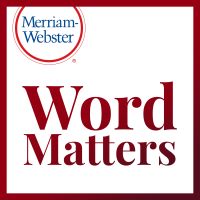
Length: between 15 and 25 minutes
Network: NPR/ Merriam Webster
Frequency: n/a
Years: 2020 – 2022
Subject: lexicography, lexicology
Format: four hosts chatting
Type of English: American
The official blurb for this episode describes it nicely: Merriam-Webster editors challenge supposed grammar rules, reveal the surprising origins behind words, tackle common questions, and generally geek out about the beautiful nightmare that is language.
A chatty, informal podcast about English and lexicography. I don’t know if the four lexicographers chosen to present this podcast were chosen for their voices, but lovely voices they have. (Jan 2023)
Words, with Kel Richards
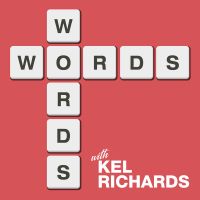
Length: 35 minutes
Network: 2GB radio Sydney
Frequency: once a week or more
Years: 2022 – present
Subject: lexicology, etymology, grammar, language policing
Format: live radio show, two hosts talking, listeners calling in and sending messages
Type of English: Australian
This was the 53rd podcast that I found for this list, I stumbled onto it when I thought I had finally found them all. And there is something that makes it different from all others, surprisingly so, because you would have thought I would have encountered this before: it is prescriptivist.
Kel Richards has opinions on how Australian English ought to be and does not hide them. During this podcast, which is an excerpt from a longer Sydney-based radio show called “Nights”, you will frequently hear him say: “that’s just wrong, those people are wrong“.
Not my cup of tea, because of the prescriptivism but also because I am not Australian, and this show is strongly aimed at speakers of Australian English. Clearly very popular as a radio show, though, judging by the many call-ins and messages the show gets. (Feb 2023)
Etymology podcasts
When I first started making this list, I had no idea how many podcasts there were out there discussing the history of English words and phrases. There’s quite a lot, as it turns out. People love discussing words, and who can blame them!
My favourite for this category is Wordy Wordpecker, which unfortunately only ran for one season. Give it a listen!
Animalogy
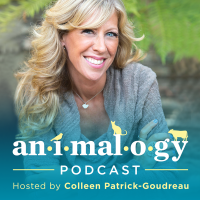
Length: usually about 30 minutes
Network: independent
Frequency: n/a
Years: 2016 – 2018 (and a one-off in 2020)
Subject: etymology of words to do with animals
Format: one host speaking
Type of English: American
Host Colleen Patrick-Goudreau talks through words and expressions that have an animal or animal part in their origin. She groups her subjects by theme and goes through quite a few etymologies per episode. For example, did you know the word “muscle” comes from “mouse” because people thought it looked like a mouse moving under your skin? No banter, just straight, interesting etymology. I really liked this one.
Patrick-Goudreau is more well-known for advocating veganism, but does not allude to that in these episodes. So you don’t need to worry about any vegan propaganda if that is not your thing. (Feb 2023)
Bunny Trails
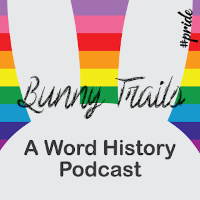
Length: about 30 minutes
Network: independent
Frequency: once a week
Years: 2018 – present
Subject: etymology
Format: two hosts talking; one has prepared an etymology and the other listens. Casual, unedited feel.
Type of English: American
This podcast is one for the hard-core etymology lovers out there. Hosts Shauna and Dan discuss the idiom in the title of the podcast, and only that idiom, for half an hour.
On the one hand, 30 minutes for just one phrase is too much for me. On the other hand, there are many podcasts out there that do short etymologies of various terms throughout their episodes. I appreciate that Bunny Trails does such a deep dive. (Jan 2023)
Getting Down and Wordy
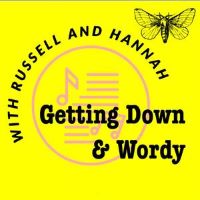
Length: about 1.5 hours
Network: podmoth
Frequency: twice a month
Years: 2021 – present
Subject: pop music, pop culture, linguistics and etymology of pop music lyrics
Format: two hosts talking, banter
Type of English: American
I added this podcast in my list because the description was “humorous etymological research probing English songs”. There’s an awful lot of banter and pop culture to get through before there’s any linguistics content (38 minutes in the episode I listened to), but then when they do get there it’s quite good.
Hosts Russel and Hannah are funny and have quite a bit of cultural knowledge. If you like banter and pop culture with your etymology, this is a good one. (Jan 2023)
Lexitecture

Length: the regular episodes are between 40 minutes and an hour
Network: independent
Frequency: about three times a month
Years: 2018 – present
Subject: etymology and trivia
Format: two hosts talking; banter
Type of English: Canadian and Scottish
One of the things that makes this podcast special is that one of the hosts is Canadian, and the other is Scottish.
The other thing is that they are very funny and personable, Amy Hanlon especially is the kind of person who could never bore anyone. They also embellish their etymology with lots of trivia and jokes.
Each host brings in one of the words in the title, and tells the other about its etymology and other interesting factoids surrounding it. (Jan 2023)
Radio Omniglot
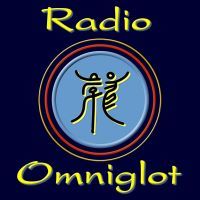
Length: 2 minutes
Network: independent
Frequency: every few days
Years: ?? – present
Subject: most episodes on etymology, other general linguistics in feed
Format: one host talking
Type of English: British
Simon Ager loves languages, speaks a lot of them, and his website omniglot.com is an amazing resource that has been going since 1998.
I haven’t really sussed out the podcast feed, but most episodes seem to be two-minute “adventures in etymology” in which Ager does a quick etymological rundown of one or two words. (Jan 2023)
Something Rhymes with Purple
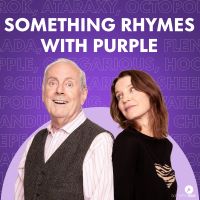
Length: between 35 and 45 minutes
Network: SomethinElse/ Sony
Frequency: once a week
Years: 2019 – present
Subject: etymology
Format: two hosts talking
Type of English: British English
Similarly to Lexicon Valley discussed above, this is another kindly old English professor going off on a tangent, except this one gets politely reigned in by Susie Dent, the UK’s most famous lexicographer. Lots of reminiscing about the 1940s to 1980s, my British mother (born 1944) would have LOVED this. They call their fans “purple people” and speak to them lovingly as if they were their children. Do with that what you will.
Great fun if you love etymology, posh English accents, and don’t mind being called a purple person. (Dec 2022)
The Endless Knot
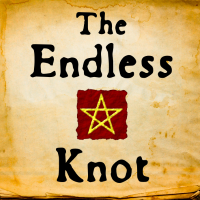
Length: usually between an hour and 1.5 hours
Network: independent
Frequency: once a month
Years: 2015 – present
Subject: etymology, history and cocktails (really)
Format: two hosts talking
Type of English: Canadian
I tried to give this podcast a quick listen just for the purposes of writing this review, but it does not lend itself to a quick listen. I’ll report back when I’ve listened to one or two episodes properly! (Jan 2023)
The Watch your Mouth Podcast
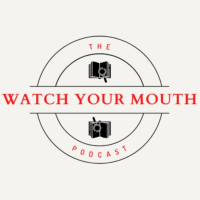
Length: about 40 minutes
Network: Silly Linguistics
Frequency: once a month
Years: 2020 – 2022
Subject: etymology, English language, general linguistics
Format: two hosts talking, banter
Type of English: American
Father-daughter duo Milo and David talk you through the etymology of a phrase, and use that as a springboard to talk about other interesting language-related things, like “what does irony mean”.
I wasn’t able to suss out what Milo’s background is but it sounds like she knows her stuff (perhaps an English teacher?). The two hosts have great rapport and are funny to listen to. (Feb 2023)
Words for Dinner
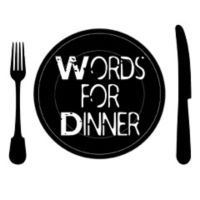
Length: about 80 minutes, the feed also includes “appetizers” which are shorter versions of the long episodes
Network: podbean
Frequency: n/a
Years: 2016-2019
Subject: etymology, the lives of the hosts
Format: two hosts chatting, banter
Type of English: American
Mike and Max sound like they are best friends, there’s lots of laughing and banter. It takes them a while to get to the etymology, which is not necessarily a bad thing, it’s like having your friends in the room.
They sound like nice guys, but for me personally, the recording quality of this show was too low, and the banter was too excessive. (Jan 2023)
Words for Granted
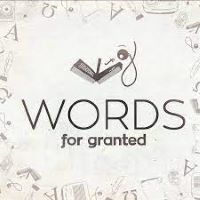
Length: about 20 minutes/ interviews about 50 minutes
Network: Independent
Frequency: about once a month
Years: 2016 – present
Subject: Etymology
Format: either one host talking, or an interview
Type of English: American
Another one I have to ashamedly confess I haven’t listened to properly yet. Here’s the blurb: One of the longest-running etymology and linguistics podcasts. Words for Granted is a podcast that looks at how words change over time. Host Ray Belli uses linguistic evolution as a way of understanding larger historical and cultural changes.
Most episodes are in-depth etymology, but he also has episodes in which he interviews other experts. (Jan 2023)
🔥Wordy Wordpecker
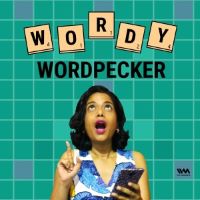
Length: about 4 minutes
Network: IVM podcasts
Frequency: n/a
Years: 2018
Subject: etymology and trivia
Format: one host talking
Type of English: Indian
This podcast discusses the etymology of modern words, meaning it is more contemporary than the other podcasts in the “etymology” section. Host Rachel Lopez is funny and entertaining and the show is well-edited with great music in just the right dosage.
It only ran for one season and as the episodes are so short you can listen to the whole thing in one go, which is exactly what I did. Such a shame no more episodes have been made, also because this is the only English-language podcast I know of with an Indian host. (Jan 2023)
Podcasts about linguistic discrimination
Dividing these podcasts up into categories is incredibly tricky, but on the whole the below podcasts tend to focus on social justice linguistics. How do people perceive different accents? Why is it important to talk about gender when you talk about language? How does language shape society? That kind of stuff.
There are many podcasts that regularly focus on linguistic discrimination that I ended up putting into other categories. The Allusionist, Spectacular Vernacular, Radiolingo, Lexis and Because Language are a few that talk about these subjects often. And basically every other linguistic podcast will touch on this subject at least a few times; it’s difficult not to!
My favourite in this list is the first season of Accentricity. This series gave me my introduction into linguistic discrimination a few years ago; informative and entertaining!
🔥Accentricity
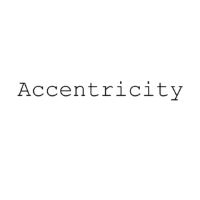
Length: varies
Network: Independent
Frequency: irregular
Years: 2020 – 2022
Subject: Sociolinguistics, accent
Format: radio documentary
Type of English: the host is Scottish, focus on Britain for first season, all over for second season
A very charming indie podcast hosted by linguistics academic Sadie Ryan. She started making the podcast as a PhD student, with an aim to make sociolinguistics accessible to a wider audience.
The first season (about accents and sociolinguistics in general) is completely different from the second (where novice podcast makers tell their own linguistic story). If you don’t like one, do try the other.
I also strongly recommend the special episode “Really this girl ought to be going to something better” – it brings to life a recent sociolinguistic paper Ryan has worked on and boy do I wish more academics would do this. Made me tear up at the end! (Jan 2023)
Talk the Talk
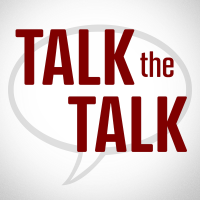
Length: between 30 and 70 minutes
Network: RTRFM
Frequency: n/a
Years: 2009-2020
Subject: language discrimination, language change, everything linguistics but the kitchen sink
Format: Live radio show. Hosts chatting, banter, some interviews
Type of English: main presenter Daniel Midgley is an American in Australia, other hosts are Australian and Swedish
This show isn’t always about language discrimination, and I could easily have categorised it under “all-round English”, but I feel the majority of episodes fall under the language discrimination banner, so here we are.
I’m always so jealous of people who can be eloquent on the spot. Just put a microphone in front of them, and they speak without hesitation and say the things they want to say and be funny to boot. Daniel Midgley is one of those people. He’s a great host.
This show is very diverse, and the show titles give a good idea of what each episode is about, making it a good archive to dip into when you fancy some linguistic chatty content in your ears.
The people who made Talk the Talk are now making Because Language. (Jan 2023)
The Black Language Podcast
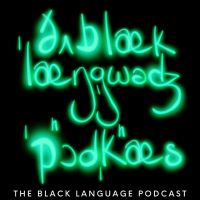
Length: between 20 and 30 minutes
Network: independent
Frequency: n/a
Years: 2020
Subject: language (mostly English) spoken by black people
Format: one host talking
Type of English: American
New York native Anansa Benbow is a linguist who wanted to make a podcast about the diversity in Black language, and what it means to be black in general.
Anansa has a lovely voice and through the 5 episodes that this short podcast aired you can hear that she is getting better at speaking and improving audio quality. It ended too soon, come back Anansa! (May 2023)
The vocal fries
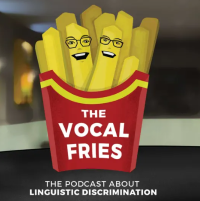
Length: usually about an hour
Network: independent
Frequency: once or twice a month
Years: 2017 – present
Subject: linguistic discrimination
Format: two hosts talking
Type of English: American
I don’t have to worry about miscategorising The Vocal Fries because it helpfully calls itself “the podcast about linguistic discrimination”. Language marginalisation and other linguistic wrongs are what these hosts are tackling.
Hosts Carrie Gillon and Megan Figueroa are personable and chatty. They manage to keep things light as they advocate for linguistic justice, while of course also getting down to brass tacks when the subject demands it. (Jan 2023)
Unstandardized English
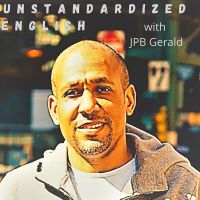
Length: varies, usually about an hour
Network: independent
Frequency: about once every two weeks
Years: 2019 – present
Subject: linguistic discrimination
Format: interviews
Type of English: American
Host JPB Gerald feels strongly about linguistic discrimination and wants to talk about it, which is why he started the podcast. As with all interview shows, the quality of the episode depends on the interviewee. In the case of this show, the sound quality is also quite varied. If you don’t like one episode, do try another (I liked “Radical Copyediting, with Alex Kapitan”). (Feb 2023)
Word Bomb

Length: usually about 25 minutes
Network: TVO
Frequency: n/a
Years: 2018 – 2021
Subject: etymology, lexicology, sociology, non-trivial trivia
Format: two hosts talking, edited interviews
Type of English: Canadian
Pippa Johnstone and Karina Palmitesta unpack “explosive words” like “cult”, “fat”, “trigger”, “expat” and “homeless”.
They give the etymology, discuss backgrounds and linguistic discrimination surrounding the term, and play snippets of interviews with specialists. I love those interview snippets especially, they are well-chosen and well-edited and make this podcast much more than just a chat between two hosts.
I think this is a great and unique concept for a podcast; it’s interesting for word lovers while also commenting on societal issues of today. (Jan 2023)
General linguistics podcasts
My podcast list focuses on the English language, but there are also a lot of podcasts out there that discuss linguistics in general. I have only included those here if, to my mind, there’s also quite a lot of content about English specifically. If you want a complete list of linguistics podcasts, Lauren Gawne has a great one on her blog Superlinguo.
My personal favourite for this category is newcomer Radiolingo. It has the kind of well-edited audio documentary format that I love, and it is accessible and interesting for newbie linguists as well as old hats. Lingthusiasm is a great one if you want to do a deeper dive into academic linguistics, while still having a pleasant podcast experience.
Because Language
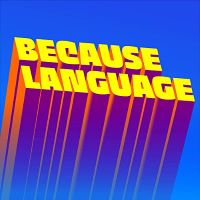
Length: usually between one and two hours
Network: independent
Frequency: about twice a month
Years: 2020 – present
Subject: general linguistics, linguistic discrimination, latest linguistic research, language technology
Format: three hosts chatting, usually with a guest, banter
Type of English: mainly Australian and American, international focus
Daniel Midgley is a great host, as I detailed above in “Talk the Talk”. In Because Language he is joined by Hedvig Skirgård and Ben Ainslie.
This show is like having three linguist friends come over for dinner. They love their topic, but are also just having a good time. (Jan 2023)
Lingcast
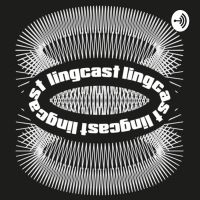
Length: 10 minutes
Network: independent
Frequency: no longer publishing
Years: 2020-2021
Subject: general linguistics
Format: one host talking
Type of English: British
Blake Reed is a linguistics graduate from Leeds university. He is clearly passionate about his subject and talks about various linguistics and English-language themes in short 10-minute episodes. (Jan 2023)
🔥Lingthusiasm
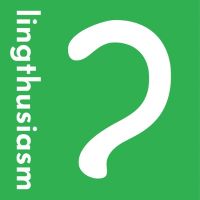
Length: usually about 40 minutes
Network: Independent
Frequency: once a month
Subject: General linguistics, making the more academic topics accessible
Format: two hosts chatting
Type of English: McCulloch is Canadian, Gawne is Australian, the focus is international
Lingthusiasm’s hosts Lauren Gawne and Gretchen McCulloch are as enthusiastic about linguistics as the name suggests. It’s a chatty podcast that makes academic linguistics accessible to a wider audience.
What’s great about this language podcast is that it doesn’t shy away from the more nitty-gritty aspects of linguistics, while still managing to explain them enthusiastically for a general audience. Other podcasts tend to just skip these subjects and stick to the basics. So if you are really interested in linguistics, this is the podcast for you!
I listen to podcasts while I am cleaning the house, and in that context I find listening at 0.8 speed makes the ladies easier to understand while also having 5% of my brain reserved for putting my kids’ toys away 🙂 (Feb 2023)
Linguistics with Laura
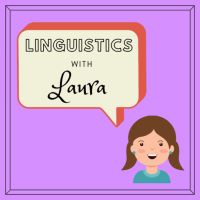
Length: between 10 and 25 minutes
Network: independent
Frequency: n/a
Years: 2020 – 2021
Subject: linguistics as you learn it at uni
Format: one host talking
Type of English: American
Host Laura Koch loves her linguistics degree and you can tell. In this short podcast series, she discusses all the main linguistics subjects which students learn when they study linguistics. A good podcast to listen to if you want a simple linguistics course or refresher. (Jan 2023)
Multilinguish
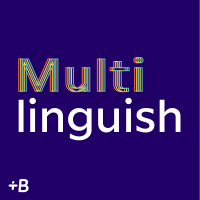
Length: usually about 45 minutes
Network: Babbel USA
Frequency: n/a
Years: 2019 – 2021
Subject: linguistics and language learning
Format: interviews with various specialists working at Babbel
Type of English: American
I was ready to not like this podcast, because it was clearly made to promote the language learning company Babbel. But it’s actually fine.
Babbel of course has a lot of specialists working for it, and they love talking about languages as much as the next linguist. Interviewing them was a clever idea. The informal interviews are pleasant and in the episodes I listened to no-one said anything like “download Babbel it’s the besssst”.
In this list, I’ve excluded podcasts that are purely about language learning. Multilinguish just bridges the gap to linguistics enough, and it is aimed at an English-speaking (American) audience, so there’s also quite a bit of content about the English language, too. Here’s hoping for a new season. (Jan 2023)
New Books in Language
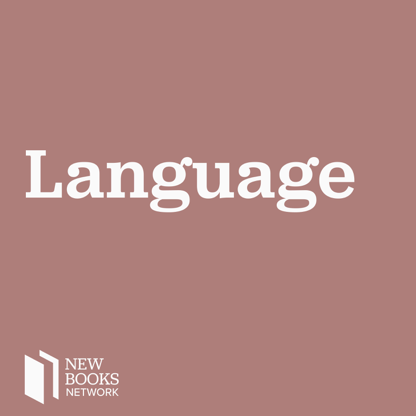
Length: mixed
Network: New Books Network
Frequency: once a week or so
Years: 2011 – present
Subject: mixed
Format: interviews with authors
Type of English: mixed
The way I understand it, Marshall Poe started a podcast channel called New Books Network in 2011, and to start with the New Books in Language feed was just that. But the network had lots of other subjects, too, like New Books in Religion, New Books in History, recorded lectures and more.
At some point, I think Poe just started putting each and every podcast episode that had even the slightest bit of bearing on language into this feed (probably automatically), which is now a mishmash of interviews. Some with good audio, some with bad audio, some very interesting, some less so. (Jan 2023)
🔥Radiolingo
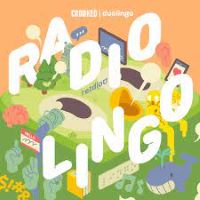
Length: between 25 and 30 minutes
Network: Duolingo/ Crooked media
Frequency: once a week
Years: 2022-present
Subject: general linguistics
Format: radio documentary
Type of English: American (but international in scope)
This is the newest player on the block, and I am very taken with it. The production quality is A+, the subjects are interesting, the host is just the right level of personable.
What I really like about RadioLingo is that it is great for all levels of linguist. Concepts are explained for those who don’t know much about linguistics, but because the podcast also focuses on latest developments, there is also plenty for knowledgeable linguists to enjoy. (Dec 2022)
Subtitle

Length: between 20 and 40 minutes
Network: Quiet Juice/ Linguistic Society of America
Frequency: twice a month
Years: 2019 – present
Subject: other languages, linguistic discrimination, etymology
Format: two hosts present edited interviews
Type of English: American (one of the hosts is a Brit in the US)
Subtitle is a professionally produced podcast that calls itself “a podcast about languages and the people who speak them”. This is a very apt description, because hosts Patrick Cox and Kavita Pillay indeed focus on the human side of their linguistic stories.
I really like nicely edited podcasts, and this is one of them. It gets straight to the point while also allowing for the hosts’ humour and personalities to shine through. (Jan 2023)
Note: Subtitle is the follow-up podcast for The World in Words, discussed below.
The World in Words

Length: between about 20 and 30 minutes
Network: The World
Frequency: n/a
Years: 2013 – 2019 (new episodes in feed are Subtitle)
Subject: other languages, linguistic discrimination
Format: two hosts present edited interviews
Type of English: American (one of the hosts is a Brit in the US)
Hosted by Patrick Cox and Nina Porzucki, The World in Words podcast was the forerunner of Subtitle, discussed above. Definitely worth a listen, though many subjects were topical, meaning a few episodes are somewhat dated by now.
Listen to Subtitle first, and if you loved it so much you finished the archive, move on to The World in Words archive, that’s my advice. (Jan 2023)
Words & Actions
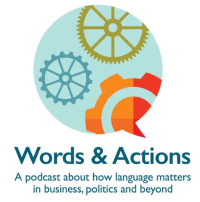
Length: about 45 minutes
Network: independent
Frequency: every month or so
Years: 2019 – present
Subject: Pragmatics, linguistics in society
Format: three hosts talking
Type of English: mixed
This indie podcast about how language matters in business, politics and beyond is hosted by three European academics. It is chatty and academic at the same time. I don’t listen to it as often as I would like, as I find I easily lose the thread if I don’t concentrate properly. This means it is not a great podcast to listen to while cleaning the house (which is how I listen to all my podcasts!) (Dec 2022)
Discourse analysis
There are lots of difficult definitions of discourse analysis out there. I’m going to give my own idea about it, which is that discourse analysis looks at the way people say things; which words do they choose to use, which idioms, which comparisons? And what do those choices say about them, about their subculture, about their society?
I’m going to be honest, I’m not really into discourse analysis, and I didn’t give the below podcasts the in-depth listen that they probably deserve. But nonetheless, here they are!
My favourite is Linguistics Lounge. It’s well-edited, and the hosts have a knack of making this tricky subject understandable.
Language & Power
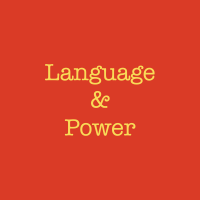
Length: usually about 30 minutes
Network: independent
Frequency: irregular
Years: 2021 – present
Subject: climate crisis discourse analysis
Format: panel discussion, one host, one or two guests
Type of English: British, focus on UK audience
As you can see above, the subject of this podcast is climate crisis discourse analysis. If you don’t know what that means, then a) don’t worry, you’re not weird, and b) this podcast probably isn’t for you.
Host Michael Farrelly leads panel discussions with fellow academics on the language used in relation to COP 26 and COP 27. (Jan 2023)
Life and Language
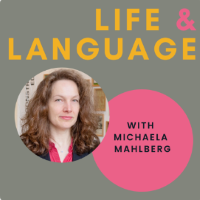
Length: about an hour
Network: independent
Frequency: irregular
Years: 2021 – 2022
Subject: literature and linguistics, storytelling, discourse analysis
Format: interviews
Type of English: host is German, interviewees are from all over
Host Michaela Mahlberg interviews authors and academics. She is charmingly excited to talk to each one of her guests, and that excitement is contagious. She lets her interviewees talk as much as they like, meaning that each episode is as interesting as the interviewee. I’m not much of a literature buff, but if you are, this is a great podcast for you. (Jan 2023)
Lingüa Brütallica
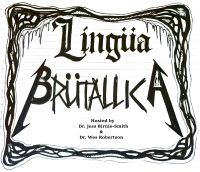
Length: varies, often about 1.5 hours
Network: independent
Frequency: about twice a month
Years: 2020 – present
Subject: ethnographic interviews into language use in the extreme metal community
Format: interviews
Type of English: mixed
The two hosts Dr. Jess Birnie-Smith and Dr. Wes Robertson speak to the lyricists of extreme metal bands about what their lyrics are like and exactly why they chose to write them that way. They go DEEP into this subject and I just wish they had chosen a music scene that I was interested in.
Most interviewees love talking about their craft, some interviewees are tired from touring and nonplussed by all these questions, but the hosts persist, which is honestly quite awe-inspiring. If you are into ethnographic interviews and/or extreme metal, this is definitely a show for you. (Feb 2023)
🔥Linguistics Lounge

Length: 27 minutes
Network: independent
Frequency: irregular
Years: 2020 – present
Subject: discourse analysis of social and cultural phenomena
Format: alternating hosts, edited interviews
Type of English: New Zealand (one of the hosts is a Brit in New Zealand, interviewees are mixed)
This podcast was a welcome surprise in this category. I find discourse analysis tricky and vague, but hosts Tony Fischer and Julia de Bres speak clearly and have a great way of leading the listener through the episode. The interviews have also been edited for clarity. (Jan 2023)
Other
This is where I am putting the podcasts that are so specialist in nature that they don’t fit into any other category. There’s forensic linguistics, history of science, literature, pop music, swears and a guy who gets stoned and reads from the dictionary.
I have two favourites in this list, Science Diction and Very Bad Words. These both have the professionally edited audio-documentary format that I love so much. That kind of format takes time to make, which is probably why they both stopped. Definitely worth listening to the archive, though!
En Claire

Length: 40 minutes to 1.5 hours
Network: independent
Frequency: irregular
Subject: forensic linguistics; who wrote this text?, codes, cryptography, undeciphered languages, and linguistic myths and legends
Format: one host talking
Type of English: British
Forensic linguistics is not really my thing, but the last season about Shakespeare was incredibly fascinating, and I think everybody should listen to it. (And when you do, you can, with me, rejoice when host Hardaker uploads the final episode, which is coming soon I’m sure.)
A note about the feed: Claire Hardaker, the maker of En Claire, includes two versions of each podcast episode, one with background music and one without. (For, I would assume, people with input overload issues.) So that’s why there’s two of everything. (Dec 2022)
🔥Science Diction

Length: about 20 minutes
Network: Science Diction / WNYC studios
Frequency: n/a
Years: 2020 – 2022
Subject: etymology, science history
Format: audio documentary, one host talking
Type of English: American
I love history of science and I love language, so this was one of my favourite podcasts to get me through the pandemic years; I’ve listened to every episode.
The history of science bits get more airtime than the etymology bits, which is why I am putting this under “other”. But its very good, give it a listen. (Jan 2023)
The Dictionary
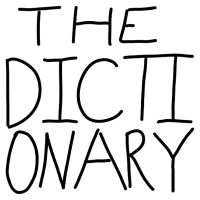
Length: between 25 and 35 minutes
Network: independent
Frequency: once a day
Years: 2019 – present
Subject: the dictionary
Format: one host talking
Type of English: American
Spencer Parks reads the dictionary. (I don’t know which dictionary) Literally. After each entry, he gives his spontaneous commentary.
It’s like having a stoned friend in the corner of the room reading out, and commenting on, the ingredients on a cereal packet, oblivious to the fact that nobody is listening to him. I’m not sure why it exists, but when I gave it a listen, it was somehow better than expected.
When I reviewed this show, it was at episode 1405 and had only got as far as the word “dip”. (Jan 2023)
The Dictionary of Mythology and Folklore
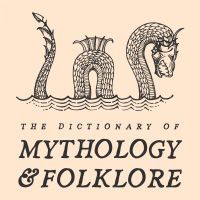
Length: 3 minutes
Network: independent
Frequency: n/a
Years: 2022
Subject: definitions of words from mythology and folklore
Format: one host talking
Type of English: American
Every short episode showcases a word or name from mythology and folklore from all over the world. Seems to have stopped after 35 episodes. (Jan 2023)
The PhonPod
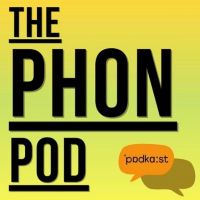
Length: about 25 minutes
Network: independent
Frequency: about twice a month
Years: 2022 – present
Subject: phonology
Format: interviews
Type of English: mixed
English teacher Vicky Loras hosts this podcast in which she interviews academics in the phonetics realm about their careers and research. A podcast for people in the field.
This is the only podcast about phonetics and phonology that I am aware of, which is weird, because you would think that a podcast is a great medium for this sound-based subject. (Jan 2023)
🔥Very Bad Words
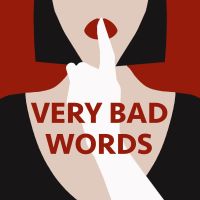
Length: about 30 minutes, there’s also 5-minute minicasts
Network: independent
Frequency: n/a
Years: 2017 – 2018
Subject: swears, sociolinguistics
Format: audio documentary
Type of English: American
I love well-edited audio documentaries, and this is one of them. Respectful and informative, host Matt Fidler dives into the sociolinguistics of profanities. This is a great language podcast, though obviously you have to be okay about hearing lots of profanities.
I haven’t listened to all the episodes yet, but plan to.
Also: who did the artwork? It’s so good! (Jan 2023)
Podcasts that didn’t make it onto the list
All of the below podcasts have titles that once made me think the podcast could be about the English language, but they are either English-language-learning podcasts, focus heavily on linguistics but not on the English language, or they’re about something else entirely.
(Honestly, this part of the list is more for me than for you. Whenever I update my list, I find I keep coming back to the same podcasts. I keep forgetting that I ever found them, and end up checking them out all over again.)
general/ other linguistics
corpuscast – for academics, will add later
dictionary.com’s word of the day – quite good, actually. might add later
exhaling words – languages, linguistics, and language learning, but not English per se. Might check it out later. (Jan 2023)
field notes – for and about academic linguists doing fieldwork, might add it later. (Jan 2023)
History and Philosophy of the Language Sciences – interviews with the great. (Also very charmed by the way the well-spoken host says “find us at hiphilangsci.net”. It’s like a poem!)
language matters by diplomatic language services – about other languages, not English. (Jan 2023)
linglab podcast – academic linguistics, might include later. (Jan 2023)
linguistics after dark – three linguists chatting about linguistics while getting drunk. Focus on academic linguistics. Might include later. (Jan 2023)
linguistics careercast – how do linguists get jobs in and outside of academia. (Jan 2023)
linguistics everyday – world languages
Merriam-Webster’s word of the day – word of the day
talk wordy to me (2019) – etymology, but only a dozen 2-minute episodes made. (Jan 2023)
tongue unbroken – Native American language revitalization and decolonization
word of the day – is what it is
language teaching/ learning
canguro English – teaching English. Recently also has “The Story of Language” in its feed, which is a series of interviews with esteemed linguist Daniel Everett. (Jan 2023)
language chats – Australian, about language learning, might check it out later. (Jan 2023)
language latte – teaching world languages. (Jan 2023)
Lingua Podcast – interviews from a language school in Germany. Also includes episodes on idioms, but these are aimed at language learners. (Great title though: “it takes an idiom to know one”) (Feb 2023)
SAGE language and linguistics – very academic, sub-podcast “Language Testing Bytes” is about language assessment (i.e. how to test students on their language skills) I actually did a course on this at uni, but still needed all my focus, and a dictionary, to understand this podcast! (Probably because it is aimed at people who have read the SAGE magazine issue it tacks onto.) (Jan 2023)
speaking of language – language pedagogy and second language acquisition
words on words – no content in feed, so probably really old. According to the internet “helping students understand and better their writing throughout their college career”. (Jan 2023)
world linguistics podcast – conjugations of Spanish verbs (Jan 2023)
translation
speaking of translation – practical tips for translators, might make a sperate list for translators one day. (Jan 2023)
troublesome terps – interpreting and language
not actually about linguistics at all
English The Podcast – is this somebody secretly recording his mates talking during class? What?
future tense – about the future, not about grammar
it’s too wordy – comic books. (Jan 2023)
note wordy with teddy – religious sermons. (Jan 2023)
talk wordy to me (2017) – books. (Jan 2023)
talk wordy to me (2021) – literature and TV in German. (Jan 2023)
(side note: in my British accent, “wordy” and “dirty” do not rhyme. It took me a bit of thinking to understand why “talk wordy to me” was such a popular title!)
the nerdy wordy book club – literature. (Jan 2023)
the wordy traveller – books & travel. (Jan 2023)
there’s a word for that – uses words as interview themes, but no linguistic observations. (Jan 2023)
word by word – Christian teachings
wordplay podcast – rap music
Did I forget a podcast, or get something wrong?
Creating this list was a lot of work, and while researching, sometimes my brain felt like it was leaking out of my ears. I’m sure I got all kinds of things wrong, so if you spot something, please do let me know.
Also: If your language podcast is in this list, and you would like me to change something about the category or descriptions, by all means reach out and let me know.
Leave a comment, find me on Twitter or Mastodon, or email me on heddwen (at) englishinprogress.net.
I’ll be updating this list all through 2023, adding any new podcasts or other new information I come across. In January 2024 I’ll give every podcast a listen again (shockingly, not all 55 are in my regular listening list) and update accordingly 🙂

Heddwen Newton is an English teacher and translator. She is fascinated by contemporary English and the way English changes. Her newsletter is English in Progress. 1100 subscribers and growing every day!
